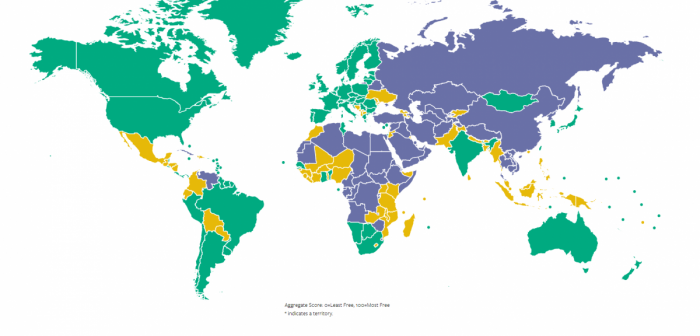
Why are democracies better for women’s representation? Our Secure Future explains the link.
Each year, the Fourth of July is lauded in the United States as a reminder that—as a democracy—the US is fortunate enough to have the best system of governance in the world. So, why are democracies considered “better” than other systems?
For women’s rights and inclusion, the answer is simple. Governments that allow for active participation from their citizens also end up allowing for better inclusion of women and other marginalized groups, creating an environment of discourse that also opens the door to better opportunities, inclusion, and overall human rights.
Research shows that a mutually reinforcing relationship exists between democracy and gender equality, which Brookings proposes might be due to three potential causes. The first is that democracies allow greater space for gender equality to take place through women’s civic activism, voting, and political representation. The second is the reverse, that gender equality drives democracy through the participation of a larger portion of society. The third is that it is not democracy, but modernization, that drives gender equality, and the correlation that exists is simply because democracies tend to be more modernized than other political regimes.
Regardless of the cause, there is certainly a correlation between regime type and gender equality that is worth examining. A study on women’s political representation found that, while democracy does not lead to immediate growth in women’s political representation at its beginnings, it does lead to greater female representation in the long term. This is because democracy’s impact on women’s participation takes longer to develop than the almost immediate impact that authoritarian or totalitarian regimes can have on participation. Instead, women in democracies have time to learn—and play by—the rules of the game to gain positions as political leaders.
This same study also found that the impact of democracy on women’s participation was greater than the impact of state-mandated quotas on the percentage of women in parliament or the specific electoral system. It was an increase in freedoms that allowed women to step into roles as activists and eventually as legislators.
Why is this important? For the advancement of Women, Peace and Security, it is critical to identify key obstacles and catalysts to women’s fair and meaningful participation. To that end, it appears democracy is a better system for the political representation of a variety of marginalized groups and a better system in general for the representation of differing interests.
To be fair, the United States currently ranks 102nd in the world for women in parliament, well behind states such as China, which has a communist regime and ranks 70th globally, and Monaco, which is a constitutional monarchy and ranks 35th. If this is the case, democracy might be the most likely catalyst for greater political representation of women, but there must also be other factors at play that need to be examined to understand the best way to achieve equality.
Political representation is an essential component for freedom. This Fourth of July, the United States is celebrating its 242nd anniversary since independence. According to Freedom House, which ranks countries according to key indicators for democracy such as political rights and participation, the country is still a free state. However, it was listed as a country to watch for 2018 and scored lower than countries such as Iceland, Finland, Sweden, and Australia (to name a few) that also ranked higher in women in parliament, indicating a correlation between women’s representation and democratic freedom.

Source: Freedom House. Green = free, yellow = partly free, purple = not free.
The United States still has a long way to go toward achieving gender equality in governance, but so long as the state continues to function democratically, the road should be paved for more female activism, participation, and leadership.
Article Details
Published
Topic
Program
Content Type
Opinion & Insights